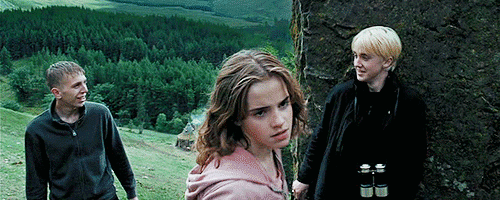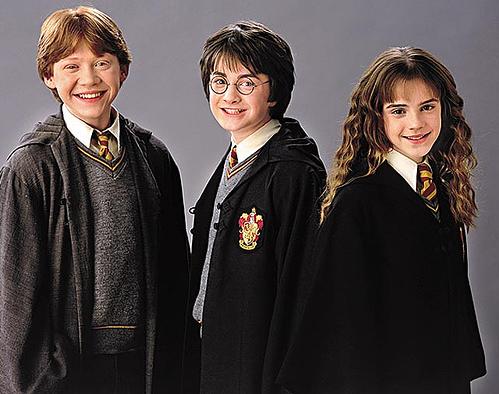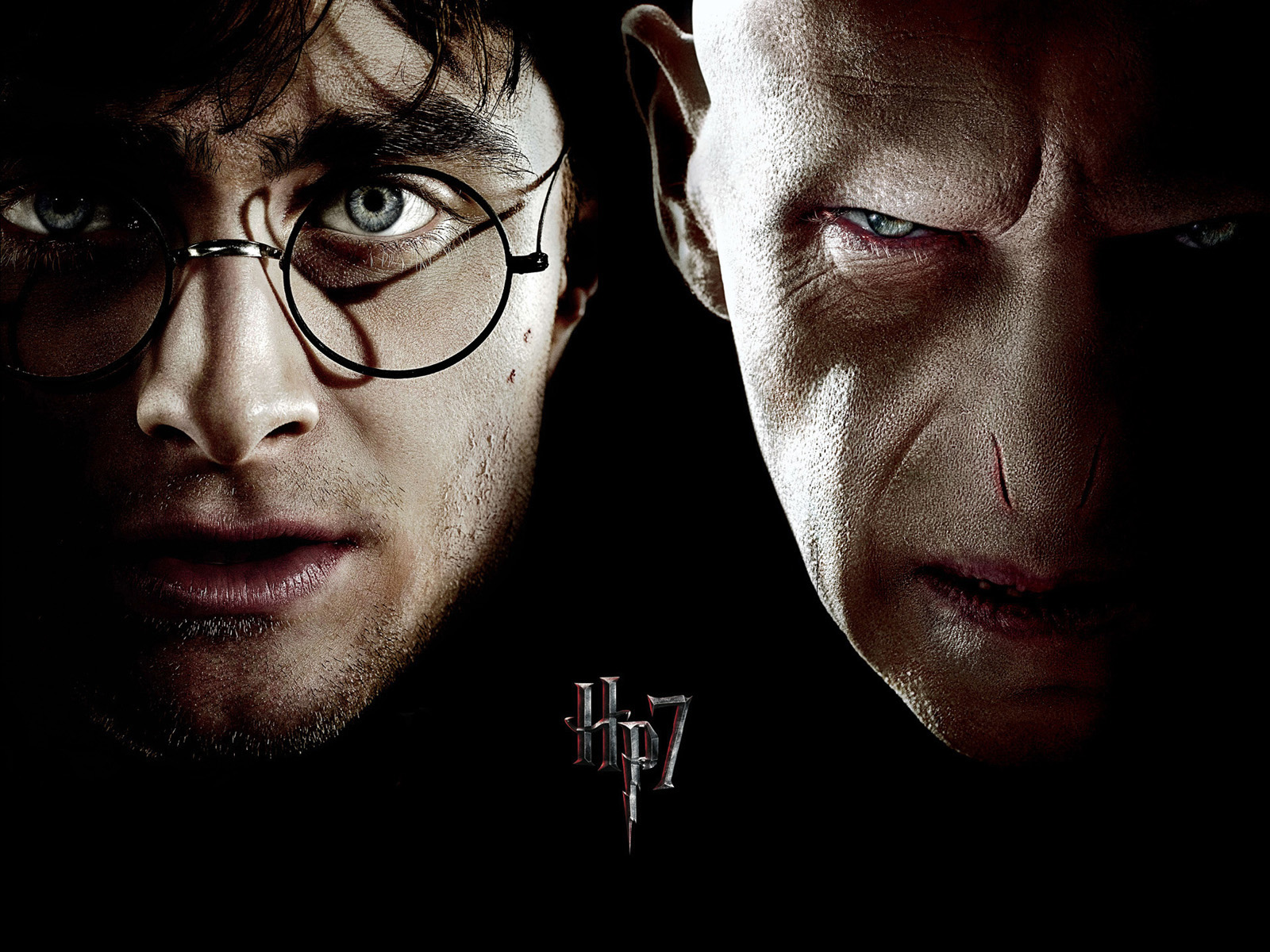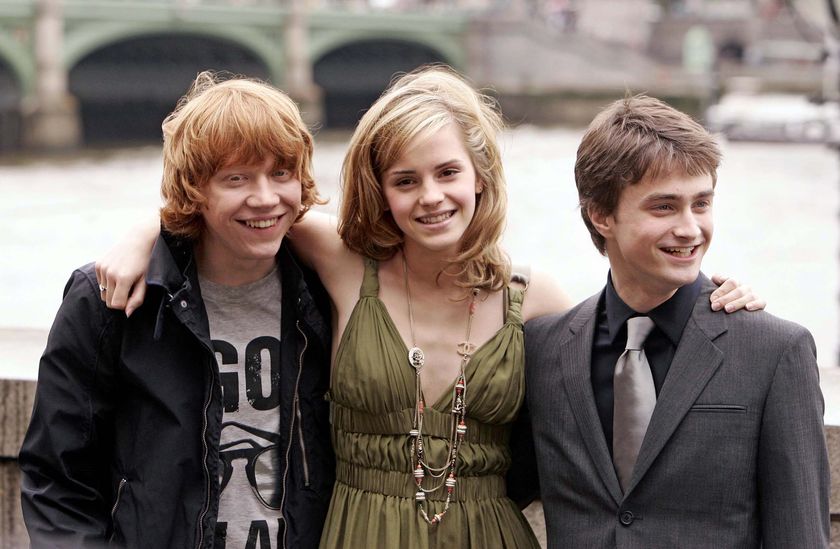I’m not a member of the Harry Potter generation – the first book was published when I was 19, so I didn’t exactly grow up with Harry, Ron, Hermoine, and the other kids at Hogwarts. I did enjoy the books for the most part and I’ll be forever grateful that JK Rowling wrote a series that inspired so many people (both kids and adults) to love reading, but my level of attachment to them is a bit different than people who did grow up alongside the characters they loved.
I’ve been observing with interest the reactions to Rowling’s admission that she regrets writing Ron and Hermione married at the end, because in retrospect, in her opinion, Hermione belonged with Harry (although she also says on second thought that maybe it could work). My friend Laura over at Challenge by Geek had quite a bit to say on the matter and it’s a good read. I understand why there are readers who hated the epilogue – I actually wasn’t that much of a fan of it myself, but I take a slightly different tack than Laura as to why.
It’s not that I find the idea of people marrying the partners they fell in love with as children/young adults to be utterly implausible. My parents-in-law met, fell in love and got married practically right out of high school. Two of my closest friends from college met when we were all freshmen together – they were dating by winter break, and are happily married and parents of an adorable child. Culturally speaking, it may not be as common, but even with younger generations, it’s still not unheard of – a lot of factors can be involved, including economic class, social environment, personality, and sometimes, people are just that lucky that at a young age, they find someone who they will love and grow with for the rest of their lives.
Nor am I puzzled by Rowling’s desire to give Harry and friends a “happy ending” because she wanted to show that even for people who had endured unspeakable trauma and challenges before adulthood, it would be possible to find “happiness” and “a normal life.” It’s not a bad thing to show that people are not forever broken because of trauma’s they’ve endured, and that friendship, love and happiness can be attainable goals for anyone (even for someone like Draco Malfoy). The normalcy that Rowling wanted for Harry and his friends is exactly what I wanted my adult life to be like after a childhood and adolescence marked by loss and upheaval. I wanted to grow up and have a happy family of my own, and I desperately hoped that the scars of my past wouldn’t prevent that from happening. Would I be able to love someone, really love them, without constantly fearing the other shoe would drop and I’d be right back mired in pain and loss? Would I be able to be a good partner and the kind of person who would be able to grow and change with my loved one, even though change had been nothing but abrupt and terrifying and something to avoid at all costs? The ending that Rowling wrote for her characters embodies the wish that I had for myself at sixteen, having lost both mother and father, being separated from my kid brother, made to move from my childhood home halfway across the country to live with relatives I’d really only seen on holidays, and having recently lost the first and best friend I’d made after moving to a hit-and-run accident. After all that, the idea of being happily married (probably with 2.5 kids and a couple of cats) in a relatively calm life was one that I clung to.
The thing of it is though, what I wanted at sixteen and what I have now at thirty-six are oceans apart. The life that I’ve created for myself isn’t exactly the life that I envisioned at sixteen, and over the years the kind of life I’ve wanted for myself, and how I define “happiness” and “normal,” have changed. With twenty years of lived experiences between me and my teenaged self, I can’t look at the Potterverse epilogue as anything other than wish fulfillment – a pretty one, but also completely lacking in realism. Of course Harry, Hermione and Ron would want to grow up and have normal lives – after what they’d been through, that would be completely understandable. Whether or not their idea of “happy and normal” was always going to involve being hetero-married with kids, and that what they wanted at sixteen is what they would want as middle-aged adults, is a completely different question.
It’s a struggle to refit the pieces of yourself together into a semblance of a functional human being after experiencing childhood trauma while growing into adulthood and, assuming this is what one wants, trying to create a healthy relationship with a life partner. Whether or not we want them to be there, the scars that we carry from childhood do influence who we grow up to be and what kind of lives we shape for ourselves, and learning to live with them can be a very, very messy process. And unfortunately, a lot of fiction like the Harry Potter series has a tendency to gloss over that fact. As much as you might wish to “go back to a normal life” after painful experiences, the inescapable fact is that what’s “normal” for you has been forever changed by what you’ve been through. There is no “going back” and learning to live with that can be one of the hardest lessons anyone can ever learn.
That jump from the end of the battle at Hogwarts, where everyone is cracked and broken to some degree, to the epilogue 10 years later where we see our gang as, for all intents and purposes, “normal” adults with “normal” lives, was jarring for pretty much the reason Laura outlined:
…in Jo’s maternal desire for her characters to end up happy, she has taken away their character. They arrive 10 Years Later with families fully-formed, adult personalities matured. Because Jo wanted them to. And for her, happiness means lack of tension or conflict or emotions that might make someone look bad.
The sheer normalcy of that ending just felt too easy. The emotion wasn’t overdone so much as startlingly tepid – even after ten years, one might expect for things to be tense, at bare minimum, when Harry and his friends spot Draco, rather than a flat, blink-and-you’ll-miss-it nod of acknowledgement. Seeing everyone, including Draco, with identical versions of “happy, normal lives,” just didn’t feel real, because that doesn’t reflect the reality of “happy and normal” encompassing more diversity than just “hetero-married with kids.”

I wonder if Draco still relives that moment in his head whenever he runs into Hermione at Parent-Teacher conferences and school events? Also, Hermione is awesome.
There’s definitely an argument to be made that of course Harry was going to marry Ginny and Hermione would marry Ron, because who else would be able to understand the terror and wonder of their experiences, and the marks that would be left behind? But it’s not one that I buy completely, if only because we don’t get to see them work out their lives beyond Hogwarts together. I definitely buy Harry being married with kids more than Ron or Hermoine, because it wouldn’t surprise me that someone who had never had a “normal” family growing up really would want that for themselves. As I said, it’s not unheard of, nor is it unrealistic to think that people who meet and fall in love with each other as young adults will spend the rest of their lives together. But that reality is becoming increasingly an exception, rather than the norm, so expecting readers to accept that ending without showing how they got there is a bit much.
Yes, this is a work of fantasy fiction, but at its heart, good fiction is just reflective enough of reality to feel, well, real, while still giving us a world filled with centaurs, Dark Lords and wizards. Too much wish fulfillment spoils the narrative, especially when it doesn’t feel “true” to the characters, much less what we know of people and human behavior. It’s not that I wish Rowling hadn’t written the epilogue to The Deathly Hallows because it ruins the story – one of the great things about fandom is that fans can disregard the parts of a story they don’t like and come up with their own headcanons, and this is, after all, her world so she gets to do whatever she wants with it, including going public about regretting narrative decisions after the fact. I just wish that her epilogue had shown Harry, Hermione and Ron as the complex, driven and wonderfully unique people we all knew they were going to grow up to be, with vibrant, diverse lives that made them happy, rather than an idealized snapshot of what we’re often told a “normal and happy life” should look like for everyone, regardless of if that snapshot is what a person would actually want for themselves.
(For the record, I rather wish Hermione had ended up married to no one in that epilogue, because she didn’t need a romantic relationship in order to have a fulfilling life, and there’s no reason why she, Ron and Harry couldn’t have remained close, loving friends after sharing those deeply bonded experiences, without any of them having to end up romantically paired with each other to be happy.)




I agree, the epilogue felt wrong to me. Too simple, too much like a reprise of their own going off to school. You’ve expressed my misgivings much better than I could, thank you.